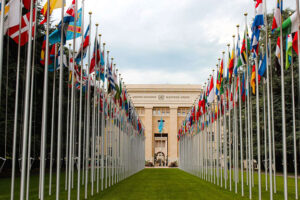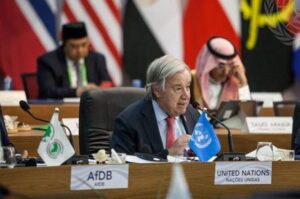
Civil Society, Climate Action, Climate Change, Development & Aid, Energy, Environment, Financial Crisis, Food and Agriculture, Global, Headlines, Human Rights, Inequality, Sustainability, TerraViva United Nations

Civil society organisations and community leaders at the Finance in Common Summit 2023. Credit: Sebastian Barros/Forus
– As public development banks gather for the Finance in Common Summit (FiCS) in Cape Town, South Africa, civil society and community activists from across the world are demanding a shift to a community-led, equitable, and human rights-based development approach, that prioritise people and planet over profit, and a reform of the global financial architecture.
“With more than 10 % global investment flowing through them each year, public development banks hold immense responsibility—not only to fund infrastructure and development but to do so in a way that is just, inclusive, and sustainable. Development that does not listen to the voices of the people it affects is not true development; it deepens inequalities, harms ecosystems, and leaves communities behind. True development is not done for communities, but with them”, says Mavalow Christelle Kalhoule, Chair at Forus.
Since its first edition in 2020, civil society has been playing a critical role at FiCS in ensuring public development banks are accountable to the people they serve, and in amplifying the voices – too often ignored – of communities in the Global South who are most directly affected by development projects.
“Over the next few days, the world’s public development banks will be patting themselves on the back for all the good they’re doing around the world. But all that glitters is not gold. Way too often these institutions are replicating a neocolonial and neoliberal approach, dividing the world between those to be sacrificed and those to benefit from the sacrifices”, says Ony Soa Ratsifandrihamanana, Africa Regional Coordinator at the Coalition for Human Rights in Development.

Civil society organisations and community leaders at the Finance in Common Summit 2023. Credit: Sebastian Barros/Forus
Amidst rising inequality, debt crises, and the climate emergency, public development banks must move beyond rhetoric and commit to concrete, transformative actions. This is why over 300 civil society groups have joined forces to bring their demands at FiCS, calling on development banks to champion a new era of development finance, placing human rights, community leadership, and environmental sustainability at the core of all financing decisions.
“The world is passing through the most critical and testing times of its history and once again the solutions are being imposed without the consent, participation and engagement of citizens at large and representative civil society in particular. This is the time to think, reflect and act out of the box, and this opportunity of coming together at FiCS should not be considered business as usual,” says Zia ur Rehman, Secretary General and Director at the Asia Development Alliance.
In a context of shrinking civic space and increasing attacks against the human rights movement, development banks should also play a more decisive role to make sure people can actively and safely participate in decision-making processes and consultations.
“While development banks acknowledge the importance of civil society engagement, their frameworks often fall short in implementation, resulting in limited access to information, tokenistic public participation, and a lack of accountability for reprisals against activists,” says Manana Kochladze, Strategic Area Leader – Democratization and Human Rights at CEE Bankwatch Network. “There is a pressing need for development banks to collaboratively develop a unified and proactive approach to safeguarding and expanding civic space”.
More than 60 civil society organizations and community activists will also join the Summit in-person, to share their first-hand testimonies on the actual impact of development projects. From renewables in Kenya to green hydrogen projects in Chile, too often projects presented as sustainable are displacing local communities, polluting the environment, and failing to ensure that the benefits trickle down to those most in need.

Civil society organisations and community leaders at the Finance in Common Summit 2023. Credit: Sebastian Barros/Forus
“When decisions are made without the input of local voices, finance becomes an instrument of exclusion, perpetuating inequality and undermining true progress. We demand a comprehensive overhaul of global financial structures that prioritizes community rights. A shift to people-led finance will enable genuine economic transformation, lifting up every individual and fostering resilient, inclusive growth that benefits society as a whole,” says Ndeye Fatou Sy, Programs Manager at Lumière Synergie pour le Développement (Senegal).
The Lesotho Highlands Water Project, for instance, provides water to South Africa in exchange for royalties and generation of hydropower for Lesotho, but has led to devastating socio-economic and environmental impacts. Hundreds of families have been involuntarily resettled and more than 30,000 people lost their cropland and grazing land, with a particular impact on women.
“As we gather at the Finance in Common Summit, we remind public development banks that front-line communities should not bear the cost of development. Public development banks must create and use independent accountability mechanisms to hear directly from local communities and ensure that their land, livelihoods, and environment are protected,” says Robi Chacha Mosenda, Senior Associate at Accountability Counsel.
Civil society and community representatives participating at the Summit will also present viable and alternative solutions, such as small-scale and renewable energy solutions that are led by Indigenous communities themselves.
“Any form of financing by multilateral development banks should start with support to community-led planning initiatives that ascertain that decisions on energy alternatives centre the rights of affected persons and communities”, says Mwebe John, Africa Finance Campaigner at Recourse. “Multilateral development banks are investing more money than ever into renewable energy, but the scale and kind of projects matters if these investments are going to truly power people and protect the planet. Community-led projects are popping up everywhere – from rooftop solar in India, to micro hydropower in Indonesia, and rural mini grids in Rwanda and Tanzania. These are the types of projects to be supported,” adds Federico Sibaja, IMF Campaign Manager at Recourse.
These stories show that it is key for development banks to use FiCS as an opportunity to step out from their echo chamber, listen to those who are bearing the brunt of their investments, and strengthen the dialogue with civil society.
Lorena Cotza is Communications Lead, Coalition for Human Rights in Development
IPS UN Bureau










